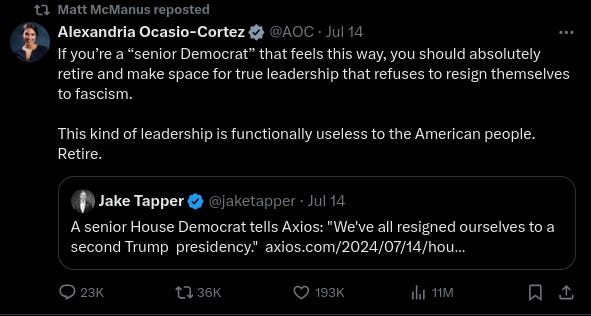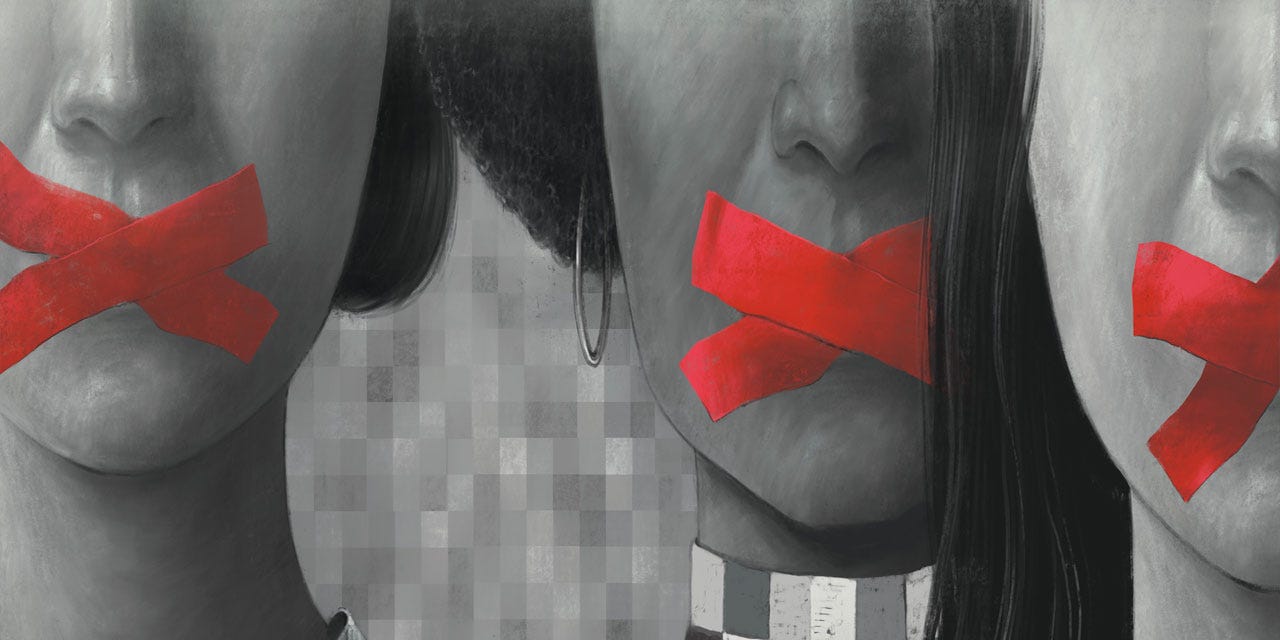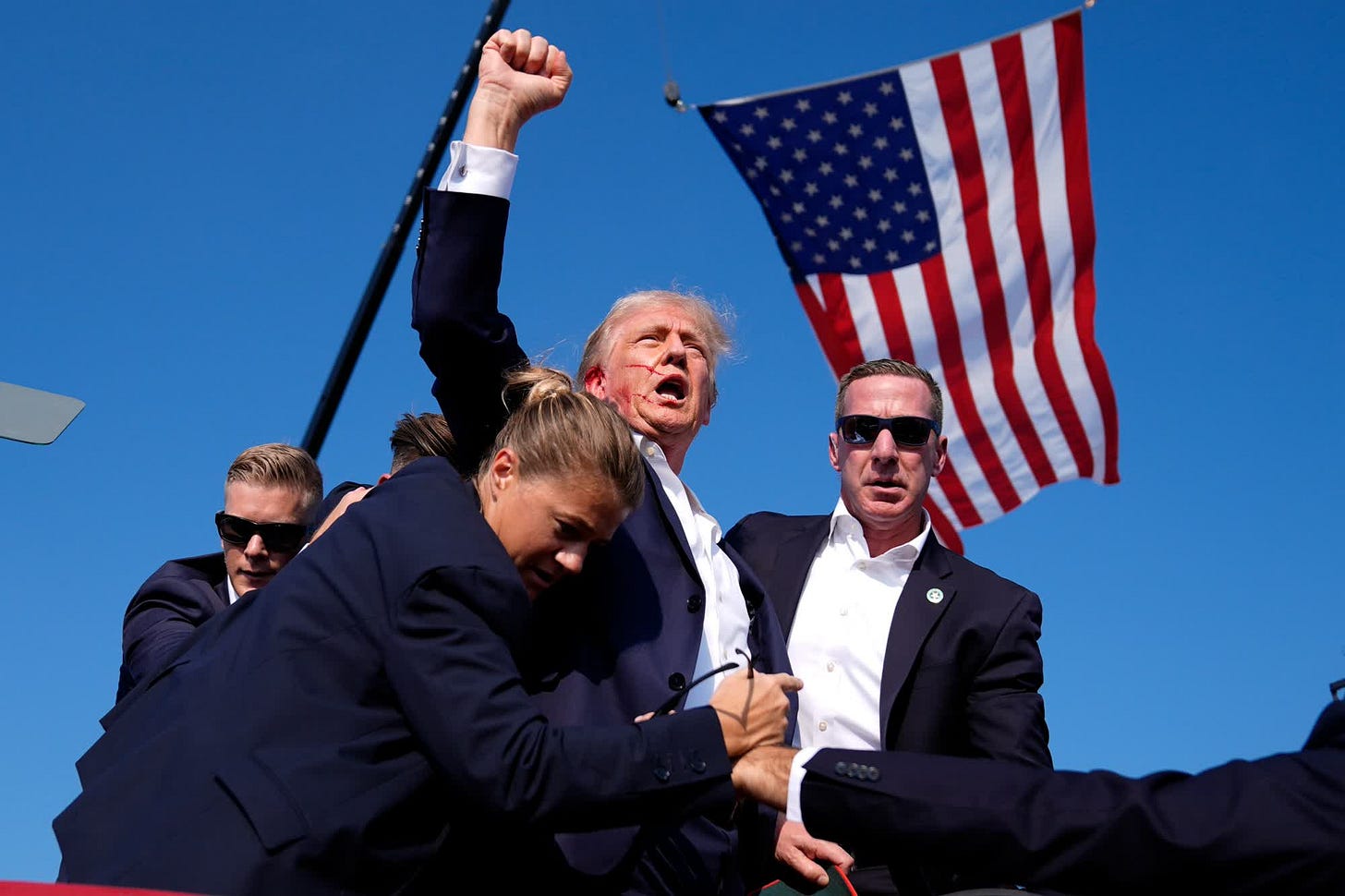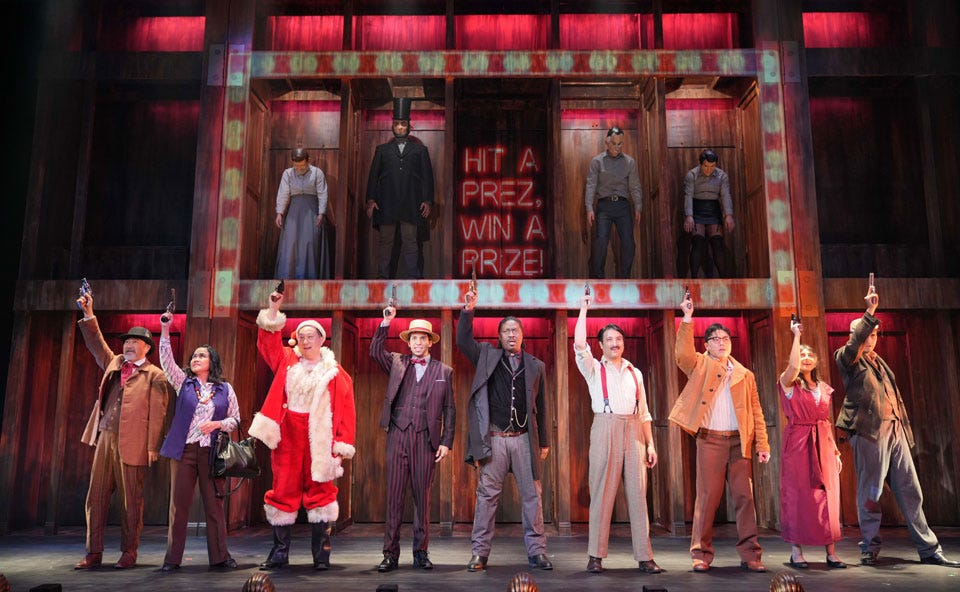English Bob: There's a dignity to royalty, a majesty that precludes the likelihood of assassination. Now, if you were to point a pistol at a king or a queen your hands would shake as though palsied.
Barber: I wouldn't point no pistol at nobody sir.
English Bob: Well that's a wise policy. But if you did. I can assure you, if you did, that the sight of royalty would cause you to dismiss all thoughts of bloodshed and you would stand... how shall I put it? In awe. Now, a president... well I mean...[chuckles] … why not shoot a president?
Last week I took a brief hiatus from Twitter for family reasons. However, the recent near-assassination of President Trump lured me back into the fray and I found myself trying to make sense of our evolving discourse around the 2024 presidential election.
Unsurprisingly, America’s mood took a chaotic turn when a Pennsylvania sniper perpetrated the first presidential assassination attempt in three decades, injuring his mark, and killing an onlooker. And it didn't take long for the nation's pundit class to show up and pour gasoline on the fire. Naturally, there were the usual front-line PR statements about condemning violence and the need for civility, but this was soon followed by petty preformative vindictiveness and outrage bait designed to feed into our perpetual political entertainment product.
This phenomenon is no better observed than in the poster boy of online left-wing “anti-extremism”, Steven Bonnell (a.k.a. Destiny), diving headfirst into the rhetorical deep-end, defending not only violence against politicians but also against civilian onlookers. After all, what better way to fight back against those who would oppose the “peaceful Democratic transition of power” than murdering them all?
That’s pretty hardcore.
I always thought Destiny was a keyboard warrior. Instead, he now seems invigorated with a new vitality, ready to charge, knife in hand, to deal death to the enemies of the Republic. Did anyone else have "arch debate bro reinvents himself as a modern Marcus Junius Brutus” on their 2024 Bingo card?
But I guess that I should give Destiny some credit. There is a certain (almost principled) constancy in his devout desire to murder his political enemies. By contrast, the mainstream media has dedicated itself to obsequious pandering, with pundit after pundit suddenly rediscovering moderate positions that they had considered anathema just the day before. Remember "The Fascist Threat of Donald Trump"? Dark Brandon memes? And “By any means necessary?” The prestige media doesn't. They are now returning to the politics of civility with op-ed writers so tame now that butter wouldn’t melt in their mouths.
How long will it last? Days maybe. It will probably be over by the time I get this article out on SubStack. In fact, I have already witnessed this process on my timeline, two tweets less than 24 hours apart, from everyone's favorite airheaded congresswoman, Alexandria Ocasio Cortes.
Long-time readers will notice that I have intentionally farmed AOC's tweets from the feed of my longtime Twitter "frenemy" Professor Matt McManus. It is a bit indulgent on my part, but the echoing sentiments demonstrate how uniform and immediate the rhetorical pivot occurred across both the academic and political classes. Despite the station or profession of the people speaking, on the left, there was a common narrative:
Violence is unacceptable. We are all part of a democratic process. We wish our honorable opponent a speedy recovery. But also, he is a fascist authoritarian dictator that, if victorious, will destroy our country, and perpetrate genocide, and we need to fight him by any. means. necessary.
This line is more or less what every leftist is saying this week. And it's unhinged.
Say what you will about the homicidal rantings of Destiny on how civilian attendees of Republican rallies deserve to be exterminated, at least the man has a certain tonal consistency. But what to make of the pablum, that we see pouring out of the mouths of respectable progressive leaders?
For instance, returning to the narrative contained in our original pair of tweets, how is one to interpret the nature of politics in 2024 from the perspective of Alexandria Ocasia Cortez or Matt McManus?
Presumably, "Fascists" (by which Cortez and McManus mean every one of their political opponents either in North America, Europe, or Russia) are an intractable threat, the moral equivalent of the Third Reich, and an enemy against which all actions can be justified to hold back the total destruction of society. But, at the same time, we are liberal democrats participating in a fair process that binds us to the will of the people. We just need to be liberal democrats who utterly destroy their fascist enemies, just like America did in World War 2.
Honestly, I sometimes wonder if Dr. McManus and Ms. Cortez believe the Allies won World War 2 by organizing peaceful protests, canvassing door to door, and “getting out the vote”.
Well, perhaps Ms. Cortez believes something like this. But I know Professor McManus understands that victory in World War 2 was accomplished by waging a total war against the Axis countries, massacring and raping their civilians, and ethnically cleansing the populations deemed too sympathetic to evil “fascist” ideas. Perhaps these actions were excessive. Perhaps these actions were necessary. But these actions were by no means “liberal” or “democratic”.
Every well-educated person knows the seedier truths behind the myth of the 20th century, but no one wants to face them head-on, and so the public is stuck with an increasingly ridiculous propaganda version of events where Dr. Martin Luther King defeats Adolf Hitler using “love” and “democracy”. But as things have developed in recent years, even devout progressives are growing self-conscious of the ridiculousness of their narrative and are looking for ways to reign in the cringe, at least ahead of this year’s election.
However, without the eternal "fascist menace" what can grant purpose to such a diverse progressive movement? How will the righteous forces of social justice understand what they are fighting for if they can’t understand what they are fighting against? There must be some narrative to support a belief in democracy that doesn’t directly owe to World War 2 propaganda, right?
Well, the good professor is on the case. Writes McManus:
The "Trump is Hitler" discourse demonstrates how badly we need other examples to enter the cultural (imagination). The most careful critics of democratic backsliding in America are more worried Trump will try to set up something like an Orban style electoral autocracy. There will still be elections and opposition parties, but the ruling right-wing elite will hedge every advantage to themselves to ensure it is nothing like a fair contest. This will be complemented by the erosion of major checks on their power by other bodies like courts. the media, international institutions etc.
This is hardly an idle concern. The GOP has been very overt about its Orban-fanboying in recent years, despite his regime's authoritarian tendencies and growing accusations of cronyism and hypocrisy. In other words 1933 and its lessons must never be forgotten, but many threat to democracy and rights don't follow the Weimar pattern. That still makes those threats dangerous and bad
Ok, so instead of “Trump is like Adolf Hitler”, we will have “Trump is like Viktor Orban…who is like Adolf Hitler”. Really, I am not sure the good Professor has expanded the progressive imagination much. But there are deeper problems with this perspective once we contract our definition of democracy to exclude leaders like Viktor Orban, who were elected by much larger margins than Joe Biden.
What exactly makes the government of Hungary a scary "electoral autocracy" and not a sacred "Democracy" like Canada or the United States? It certainly isn't the number of votes stuffed in ballot boxes in support of the government.
Perhaps, to be a “Democracy” your elections must be relatively unaffected by external actors? Not likely. Independence from NGOs, foreign lobbyists, and transnational bodies is a hallmark of Orban's worldview, and his opposition to such is one of the central complaints of progressives like McManus.
Or else maybe Democracies require "independent" judiciaries and "administrative institutions"? That does sound classically liberal. But remind me what "independent" means in this context. Independent from Democracy and the Democratically elected parts of the government? So paradoxically to be a true Democracy you have to be less democratic.
Perhaps the best approximation of Matt's objection is just that elections in Hungary aren't "fair" contests since certain institutional arrangements favor Orban or the right wing generally. But by those standards is America a Democracy?
We might overlook the fact that corporations are forced by law to include ideological training programs for employees organized around progressive values; we might even discount the reality that the vast majority of our unelected government and prestige press are loyal to the Democrat party. But how can a Democracy be considered “fair” when one side of the political spectrum controls the country’s tax-payer-funded education system?
Presently, in America, the path to virtually all professional jobs involves spending tens of thousands of dollars, and years of one’s life, to attend institutions of higher learning that are effectively progressive seminaries. Today’s prestige universities not only require mandatory progressive political indoctrination for students but also compel their staff to write statements dedicating their research efforts to the ends of left-wing political projects as a condition of their employment and funding.
When every one of your future "thought leaders" is trained from youth to conform to the preferences of one side of the political spectrum, are we right to expect government institutions to be managed fairly between the contesting parties? Would that not constitute some institutional “unfairness” of the type Matt thinks may exist in Hungary?
Maybe.
But I am not holding my breath waiting for Dr. McManus to suddenly care about political fairness inside government-funded universities; much less his desire to "democratically" allow conservative Michigan voters to decide who they want to teach their future leaders politics at a high level. No doubt McManus would consider such Democratic controls to be a threat to the University's "independence".
So around in circles we go. The institutional advantages secured by my enemies are fundamental violations of justice that undermine Democracy. Those that advantage my friends are just part of an independent system of “checks and balances”, a natural extension of “the way things are”. And it is not that modern progressives like Matt are unaware of these hypocrisies, they know that they would be screaming bloody murder if the situations were reversed. They just don’t care.
What makes all of this discourse so tiresome, so futile, is that we have to at all times misunderstand the nature of democracy itself. At the end of the day, there is no eternal and true democratic will the way that we talk about it in the lead-up to elections, there is just a process of managing public opinion with known inputs, choke points, and vulnerabilities.
Take every leftist’s favorite example of a “fascist” dictatorship: the German Third Reich. Could we say that the Nazi party was anti-democratic? That’s hard to determine. As everyone knows Hitler's government was initially elected. But even after the War began and democracy was suspended, the national socialists held overwhelming public support across all areas of German society.
I am grateful to have learned about this reality directly from my father and grandparents who lived through World War 2, but contrary to what you might understand from Hollywood movies, the German people were almost uniformly in support of Hitler's regime up until the very end of the War. Of course, there were no opinion polls in 1945, but if you listen to anyone from this time, they will tell you something similar. Support for the Nazi party was high, even as the consequences of Hitler’s war were burning Germany to the ground.
Was this the consequence of Nazi propaganda? Or perhaps a more organic sense of rallying around the nation in a time of crisis? This is impossible to say. But this dedication to esoteric German nationalism was strong, so strong in fact that it required a totalitarian program of post-war propaganda, "De-Nazification", to suppress, and only remained suppressed through ideological control of media institutions across the 20th century. Now that the American post-war liberal order is declining in Europe, the power required to keep this tendency in line is becoming distinctly harder.
Despite what 20th-century propaganda might teach us, pure democracy is simply large swells of emotion, vibes, and preference cascades. It is an undulating chaos that, while it has patterns, has no reason or guiding wisdom to its ultimate decisions. Organize a society around this organic democratic force and you just get madness. Attempt to manage it using ideological institutions and you are employing those “fascist” tools of indoctrination and propaganda. Yet this is the god we have chosen to idolize in the 20th century, and which we have to pretend we care about in the lead-up to every American election.
And all the while each belligerent in this pantomime has to play into the same tired lie. Democracy is good, but only in that very particular way where your enemies have to constantly twist themselves in pretzels to placate an irrational popular sentiment, while you advance your ideological control over the institutions that manage public opinion behind the scenes.
Naturally, to explain these circumstances, we read our preferences into the "will of the people" and cast our enemies as its evil subverters. The net effect is every political conflict is transformed into a religious war against the other faction, with each side fighting for their god ("Democracy") against the evil heresy ("Fascism). And as much as the respectable media class is pretending to be offended when Steven Bonnell talks about the sublime moral necessity of murdering one’s family because they voted for the wrong team, Destiny's logic is, at the end unassailable, he is just connecting the points of logic already put in place by our system.
Here, I arrive at my purpose in writing this essay, which, believe it or not, was not an extended attempt to accuse the left of “hypocrisy”, but rather to grapple more deeply with how our ordinary electoral discourse is unsuited for these days of late Democracy. After almost two decades of watching the political narrative of liberal democracy collapse around us, I think many people might be ready for a more sober look at the problems we are facing and what a proper response should be.
The Heart of our problems goes back to a fundamental misunderstanding about politics in the modern world. Despite what the luminaries of the secular enlightenment hoped, there is no such thing as peaceful political discourse outside of a shared set of moral values. And once society loses its animating religious and ethical principles it will naturally fall into degeneration and chaos.
This reality creates a crisis for thoroughly secular societies based on dialectics, as are all modern Western Societies. And the problem is only compounded for democratic systems that rely on civil public discourse and agreed-upon moral arbiters to manage an otherwise chaotic popular will with lawful constraints. Without the explicit moral authority of a shared religion (or the implicit ethics of a shared culture), the necessary societal trust falls away and is supplanted by power politics.
Each faction has its people and concerns, but there is fundamentally no reason that can arbitrate a dispute between either party save an appeal to force. And so as rhetoric escalates and order declines, there is a slow descent into Hobbes' Bellum omnium contra omnes.
Ultimately, I believe that the only answer to this fractured moral landscape is a return to more ancient understandings of morality and government, replacing the Enlightenment’s focus on systems and ideology with an understanding of individual nobility and collective well-being. Arguably, this aristocratic approach to politics is much closer to historical normalcy for the human race, and now many thinkers, from very diverse backgrounds, are beginning to consider solutions along these lines.
However, what makes our modern condition particularly insidious is that even while we might be consciously aware of modernity’s limitations, our thought process has been completely formed by it. As such, whenever we are not consciously engaging with the problem of the Enlightenment’s mistakes explicitly, our instinctive thought process keeps sliding back into the same failed mode of “democracy brain”. We keep on pushing buttons to systems that have long since been broken, and reenacting rituals for religious modes that have been dead for decades, and while we are stuck playing the cargo cult pantomime for the old dead gods, the necessary tasks in front of us pass by unaccomplished.
Take, for instance, the right wing’s reaction to Trump's near-assassination, at once finding itself unwittingly on the right side of a new cycle. Like a dog finally catching the car, conservatives barely know what to do with the win. However, in the absence of any broader plan, most just mirror the left's late democratic performance politics invented by the likes of John Stewart: whinging about “overheated rhetoric”, trying to scapegoat pundits and politicians for their role in “Stochastic Terrorism”, and attempting to foment online outrage to go after private citizen's jobs.
Are these tactics justified? Are they effective? Will they own the libs?
Maybe. But what’s more obvious, to me at least, is that these methods embody a fundamental misreading of our political moment.
All of these political approaches from “cancelation” to online moral outrage, are the product of a specific political moment that is in the process of fading. These tactics worked, to an extent, in the old world with established norms, active mainstream media, and a managerial class that didn't quite understand how the undulations of online opinion worked. But these unique historical circumstances are slowly passing away, and subsequently, this passive-aggressive political praxis will slowly stop paying dividends. In some ways it already has.
But, on a more fundamental level, these petty games don’t address the core political crisis that we are dealing with in the present year.
For instance, take "Stochastic Terrorism" a concept emerging prominently in the wake of the attempted assassination of Gabriel Giffords. Broadly, the concept stipulated that "overheated political rhetoric" (specifically from the media's conservative enemies) was directly responsible for the congresswoman’s near murder at the hands of a schizophrenic shooter. At first glance, the concept is transparent political manipulation. Virtually any political crime can be attributed to a hostile cultural environment, and if any negative statement made about another group or person can be construed as contributing to that hostile environment then virtually anyone who engages in heated political rhetoric can be portrayed as an accomplice to terrorist acts.
Under the standard of “Stochastic Terrorism”, virtually everyone who engages in politics is implicitly guilty of pre-crime. The only question is how the issue is framed. Which party is the one that has to constantly police their rhetoric for what could be misconstrued by disturbed violent individuals and which party gets to be the arbiter of political civility? In the context of democracy, the usefulness of this rhetorical frame game is inescapable. The label of “Stochastic Terrorism” is a weapon, and like all effective weapons of war, each side must use it or be overwhelmed by their opposition.
However, if one removes their democracy beer goggles and examines the complaints about “Stochastic Terrorism”, it is immediately apparent that the concept is a stand-in for a much more relevant political problem that has emerged in the age of social media and unrestricted information. The real problem we are dealing with when we complain about “Stochastic Terrorism” is the naturally corrosive effect that social media has on public discourse. As an intelligent creator looking for clout, it behooves any influencer to use jokey over-the-top rhetoric when discussing political ideas. The approach makes otherwise dry content more interesting, the creator appears fearless, and everyone with a reasonably high IQ can parse out the serious ideas from the hyperbole.
Well not exactly.
As everyone who has observed online communities will tell you, while political ideologies may begin with intelligent individuals who can parse irony, they certainly don’t end up that way. As an idea gains more salience (online or IRL) it obtains a broader audience and it naturally drifts down the IQ Bell Curve. Inevitably, as the worldview becomes mainstream, its subtle and introspective ideas are dumbed down, its cathartic elements are exaggerated, and the ironic over-the-top humor used to express them is replaced by sincere vindictive aggression.
Everyone thinks their political community is immune to this problem. But no one is. What we are seeing here is just the physics of ideology itself, the flip side of the Dunning-Krueger effect. While there may exist elite people, there is no such thing as elite worldviews. Subsequently, the inevitable consequence of winning popularity in the “marketplace of ideas” is that your ideas are repeated by increasingly less intelligent people. This is a distinct problem for communities built around discourse in the age of rapid information transfer.
But what is the solution to this problem? It’s hard to say.
The best that I have been able to come up with is to refocus my efforts less on “winning the argument” and more on cultivating a community with ideas that translate well for people with less command of nuance. It’s not much, but it’s a start. And I certainly want to see what other solutions to this problem would look like. But no one is going to discuss solutions seriously, because there is no political benefit to fixing this problem. So in the true democratic spirit of “never letting a crisis go to waste”, expect to see endless discourse blaming the other political side for engaging in “Stochastic Terrorism” with no attempt to address the question of morality and ideological ownership at its core.
This is the problem with all of these cynical political games from cancelation to “Stochastic Terrorism”, they may be effective in the moment but they don’t do anything to address the key questions we are struggling with.
Our historic question, at this moment, is not who can be fired from corporate or government institutions but who can responsibly manage them. Our question is not which vapid opinion columnists can be de-platformed from their sinecures in failing legacy media institutions, but rather which voices can provide healthy and wise ideas to a polity that is rapidly degenerating into hedonism. Our question is not who can win, for a moment, the approval of fickle democratic chaos, but who can rule over it and establish order.
Obviously, no one wants to live in a world where our clerks and kindergarten teachers are publically cheering on mass murder and political assassination; and a righteous government would have every right to punish them for violating good sense. But we do not have a righteous government in place, and these low-class dimwits aren’t violating any social norms they are aware of, in fact, by publically expressing this violent rhetoric they are trying to conform to what they see as community norms.
The mistake implicit in mirroring left-wing political tactics, is that it confuses an imminent and practical question (“What is to be done at this moment to help us secure further power?”) with an abstract moral question (“Can we fight fire with fire?”). Removing these silly people from their jobs does absolutely nothing to accomplish the central political imperative of replacing the existing government and establishing a way of life that is more resistant to the poisons of modernity. We don’t want to engage with online cancelation campaigns not because they are, in the abstract, immoral, but because they are practically beneath our aspirations. Lowering ourselves to the base level of punishing peasants for acting like peasants hurts the over-arching goal of elevating society.
Furthermore, the behavior represents a fundamental inability to appreciate the profundity of the moment when a freshly bloodied Donald Trump stood up and raised his fist shouting “Fight!”. We are witnessing something that is much more powerful than a petty opportunity to punish our political enemies at the lowest levels. We are witnessing the potential re-emergence of a politics of courage and aristocracy, a deeper understanding of power and ownership as it relates to the government of humanity.
This assertion feels like hyperbole. But that is the emotion we all felt watching the assassination attempt on video and looking at this iconic photo.
The events of the last week have put me in mind of a famous piece of dialogue from one of my favorite Westerns, the 1992 film, Unforgiven, in which British gunslinger, “English Bob” condescendingly scoffs at the recent assassination of then President James Garfield, contrasting the prestige of elected officials with the majesty of a king, and remarking flippantly “Why not shoot a president?”. It's a classic piece of dialogue, probably only included to establish English Bob as a heel. Nevertheless, I think about this scene a lot these days.
There is something about the notion of shooting the head of state that extends directly from the logic of mass democracy. Now certainly, murder has always been a tool of politics from antiquity to the age of absolute monarchy. But it wasn't until the era of democracy that assassinations developed their distinctly performative quality. In the time of mass politics, it was somehow no longer necessary for the assassination to be part of a broader plot to replace the government with a pretender. Instead, under more democratic systems, assassins carried out entirely futile acts of political violence to make some broader “point” to the public at large. As Steven Sondheim understood, in America, assassination is all about the performance.
Here, one sees the President, not a man, not even a leader, but the representative of that dark god called “Popular Will”, and in a single moment, with a single act of defiance, a gunman may strike him down. This is the ultimate act of cathartic drama. And it's no accident that the grand tradition of murdering American presidents began in a theater, the culprit leaping onto the stage and shouting a paraphrased line from Shakespeare.
Futile performative assassination is where the logic of democratic violence begins, but not, unfortunately, where it ends. And it's only a small logical leap from the methods of John Wilkes Booth to the broader application of political violence as imagined by Steven Bonnell. This is what concerns me. If the killing of a president is the natural expression of democratic political frustration, how much longer until it is directed against the populations he represents? It is the genocidal logic of the early twentieth century returning once more in the twenty-first.
What is the way to step back from the abyss?
As I see it, any solution must begin with rediscovering the mode of aristocratic politics. We must recognize the political actor not as the representation of public opinion much less the extension of an ideology, but rather as a man bound by faith to moral restrictions and by honor to defend his nation. There is no “will of the people” much less a collective ideology they can hold. There are just leaders who sacrifice what they can to secure an ordered future for the collective they are sworn to defend. In this frame, the goodness of a ruler is not determined by the particular theory of politics he follows, but rather by his character as revealed in the small moments of truth he encounters through practicing his vocation.
That certainly is a tall order, but I think we have witnessed something of this aristocratic nature in the actions of Donald Trump in the last week.
I will be honest. I never liked Trump personally. He was crude. He was irreligious. And despite his wealth and confidence to operate inside elite circles, there was something about him that was distinctly low class. But still, despite all of my reservations, he is walking the path of the aristocratic leader.
Sometimes, I think we misunderstand the nature of nobility. To be sure nobility may be cultivated. But more often than not, as Shakespeare put it, the quality is thrust upon men by circumstance. And this is something that I recognize occurring in the character of the Donald. He most likely started his political career for entirely egotistical reasons. Nevertheless, as he was assaulted on all sides by the slings and arrows of both enemies and former friends he never flinched. And in those circumstances, he became more than the man he once was.
And this process reached a conclusion this week when Trump, wounded by his would-be assassin’s bullet, muscled over his bodyguards, stood tall, and shook his fist in defiance. Whatever Trump’s other flaws, he became a king in that moment. And, had an assassin been still alive, his sights trained on his target, he would have hesitated, stricken as if in awe.













There was something inherently noble in the manner by which Trump faced what he knew could be his death.
In that moment as you said he revealed a stronger character than what we knew he previously held, and likely than what he knew he had, great article.
We live in interesting times, the tendency from here is escalation.
I've advocated political violence once in my life.
During COVID I felt that the restrictions of government had reached a point that were "unconstitutional" in not just a legal but spiritual sense. I felt that while I could normally stomach losing political contests and having policies imposed on me that I disagreed with even strongly, there was a class of "rights" beyond all that which nobody could touch. In fact having such a class of rights is what makes it easier not to become consumed by politics.
I kept wondering "when is someone going to assassinate Fauci?" "When is a mob going to beat a school board to death?" "Why the hell has my church agreed to suspend communion?" "Why don't people tear down these barriers and just live?"
And then after wondering this for months...leftists just did all that in the name of hating white people and destroying property! And we all just sat around and let it happen. The the authorities supported it while they policed children hugging mothers at funerals and made toddlers wear masks all day!
I always thought of Jan 6th as "the covid riot". Whatever was going on in the head of the people actually doing that, I wondered why it didn't happen 1000x over for the last year.
I can't understand the assassination of Trump because I can't understand someone objecting to him that much. Not a rational person, even a person who doesn't want him to be president. I reject political violence in basically all cases. But I do feel like the Americans of 100 years ago simply would not have put up with that shit in 2020.